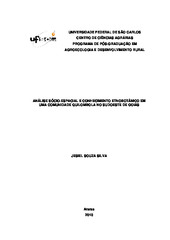Análise sócio-espacial e conhecimento etnobotânico em uma comunidade quilombola no sudoeste de Goiás
Resumo
Quilombos are the greatest symbols of resistance against the system of slavery that continued in the Brazilian territory for many years. Spread throughout the Brazilian territory these communities have created strategies model of survival against the hub and conservative land, and fight mainly to have their territory recognized and respected. In this context the community of Cedar, in southwest Goiás, is a community made up of descendants of former slaves and who recognize themselves as bearers of an identity based on the same origin and a common culture distinct from other groups surrounding. This paper seeks to show how this community of spatially established in a territory where there is predominance of monoculture and how to setup ethnobotanical knowledge in this area. We analyzed data from 25 family units, relating to housing, lifestyle, sociospatial training, health, education, values, culture, attitudes, opinions of the individuals interviewed and traditional knowledge regarding the use of medicinal plants, were mentioned 94 plant species used for medicinal purposes, and leaves the predominant part in the medications. This community maintains practices brought by their ancestors centuries. One reason for the intense relationship between this community and environment in which it operates is providing numerous resources that nature provides to this community and are essential for their survival and reproduction.
